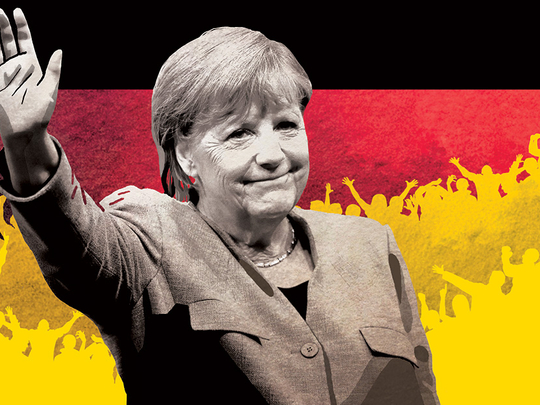
Next month, Germany heads into the last of this year’s big European elections. Unlike France and Britain, this one really does look like a foregone conclusion: Chancellor Angela Merkel, leader of the centre-Right CDU, is about to get a fourth term. If she goes the full term, she will be the longest-serving chancellor since the founding of the Federal Republic. But this does not mean the election will be boring, or without lessons for Theresa May and the Conservatives. Merkel is a highly intelligent, politically deft operator who likes to nurture consensus — not a charismatic visionary. But she is also hugely popular among Germany’s young, transformed in their eyes from “Mutti Merkel” (mum Merkel) to “Oma Merkel” (granny Merkel) — the granny who is now preferred to the centre-Left candidate Martin Schulz by an overwhelming majority of the under-30s. How has she managed this? Why is she seen by so many as “cool” — to use the old-fashioned English word the Germans have borrowed and still happily apply to anything fashionable?
The answer begins with the alternatives. Most of the young take for granted a pro-European orientation, so they don’t vote for the Right-wing AfD (Alternative for Germany) and its “Germany first” view of the world. And only a small minority support the hard-core offering of Die Linke (the Left party). They assume, too, that the environment will remain a policy priority for any government, so unless they have a passion for the minutiae of renewables technology, they don’t feel the need to vote Green. But why Merkel, rather than Schulz, leader of the SPD? A year ago, Merkel was on the ropes as she faced the backlash from her open-door policy for Syrian refugees. Then Schulz was suddenly the new and more exciting face of the centre-Left. For a while, it seemed as if the chancellor’s time was up. The old hated her stance over asylum-seekers; the young would surely follow the SPD’s new Pied Piper. Not a bit of it. Schulz made social justice the centrepiece of his strategy — safe ground for the SPD, certainly, but not exactly a clarion call to the young in a country that by any standard is relatively inclusive and already provides them with good skills and prospects.
Merkel, on the other hand, strikes them as administratively and economically competent. Most importantly, she does not alienate them by championing either red-in-tooth-and-claw market capitalism or a back-to-the-Fifties social conservatism. And on the issue that all the polls show is at the forefront of voters’ minds — migration — the overwhelming majority of the young are notably supportive of Merkel. In the heady days of August 2015, they were enthusiastic backers of a policy that saw a million new arrivals in 12 months. When she used that emotional phrase “We can do this”, her words resonated with them — perhaps for the first time.
During the difficult times last year, as the government sought to grapple with the logistical challenges of that influx and the country reeled from terrorist attacks in Munich and Berlin, youth support waned — but much less so than that of the population as a whole. Now the young see a job well done, with Germany standing taller as a result. Much of the appeal lies with the person of Merkel herself. Her detractors see her as an unprincipled manoeuvrer who knows above all how to hold on to power. But that is not the view of large swathes of the young. For them, she is authentic. What you see is what you get — a hard-working, conscientious, intelligent leader. Is there a lesson there for Mrs May?
The political rewards on offer are immense. Young people in Germany now trust Merkel more than any other person to captain the national and European ship. Not even the contrast with France’s fresh-faced new president has shaken that faith. In many ways, Merkel is an anti-Jeremy Corbyn, the British Labour party leader. Yet, she too has built a strong support base among a new generation. The Conservatives in Britain should take a leaf out of her book. For, the young of Britain are not so different from the young of Germany. Appealing to them will take self-examination and imagination, but it need not be a fantasy.
— The Telegraph Group Limited, London, 2017
Lord Green of Hurstpierpoint is the author of Reluctant Meister: Germany and the New Europe.










